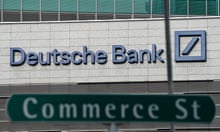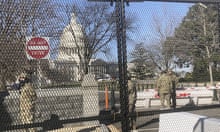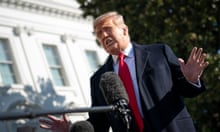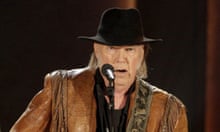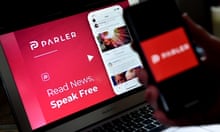In the 24 hours since the US Capitol in Washington was seized by a Trump-supporting mob disputing the results of the 2020 election, American social media companies have barred the president from their platforms for spreading falsehoods and inciting the crowd.
Facebook, Snapchat and Twitch suspended Donald Trump indefinitely. Twitter locked his account temporarily. Multiple platforms removed his messages.
Those actions, coming just days before the end of Trump’s presidency, are too little, too late, according to misinformation experts and civil rights experts who have long warned about the rise of misinformation and violent rightwing rhetoric on social media sites and Trump’s role in fueling it.
“This was exactly what we expected,” said Brian Friedberg, a senior researcher at the Harvard Shorenstein Center’s Technology and Social Change Project who studies the rise of movements like QAnon. “It is very consistent with how the coalescing of different factions responsible for what happened yesterday have been operating online, and how platforms’ previous attempts to deal with them have fallen short.”
Over the past decade, tech platforms have been reluctant to moderate Trump’s posts, even as he repeatedly violated hate speech regulations. Before winning the presidency, Trump used Twitter to amplify his racist campaign asserting, falsely, that Barack Obama was not born in the US. As president, he shared racist videos targeting Muslims on Twitter and posted on Facebook in favor of banning Muslims from entering the US, a clear violation of the platform’s policies against hate speech. He retweeted to his tens of millions of followers a video of one of his supporters shouting “white power!” in 2020 June. He appeared to encourage violence against Black Lives Matter protests in a message shared to multiple platforms that included the phrase “when the looting starts, the shooting starts”.
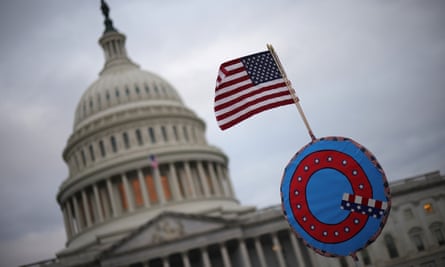
Trump’s lies and rhetoric found an eager audience online – one that won’t disappear when his administration ends. Experts warn the platforms will continue to be used to organize and perpetuate violence. They point, for example, to Facebook and YouTube’s failure to curb the proliferation of dangerous conspiracy theory movements like QAnon, a baseless belief that a secret cabal is controlling the government and trafficking children and that Trump is heroically stopping it. Parts of the crowd that stormed the Capitol on Wednesday to bar the certification of Trump’s election defeat donned QAnon-related merchandise, including hats and T-shirts, and the action was discussed weeks in advance on many QAnon-related groups and forums.
QAnon theories and communities have flourished on Facebook this year. By the time the company banned QAnon-themed groups, pages and accounts in October, hundreds of related pages and groups had amassed more than 3 million followers and members.
YouTube removed “tens of thousands of QAnon-videos and terminated hundreds of channels” around the time of Facebook’s measures. It also updated its policy to target more conspiracy theory videos that promote real-world violence, but it still stopped short of banning QAnon content outright. A spokesman from YouTube noted the company had taken a number of other actions to address QAnon content, including adding information panels sharing facts about QAnon on videos as early as 2018.
Trump’s leverage of social media to spread propaganda has gone largely unchecked amid a vacuum of laws regulating government speech on social media, said Jennifer M Grygiel, assistant professor of communication at Syracuse University and expert on social media.

Grygiel cited the Smith-Mundt Act of 1948, which regulates the distribution of government propaganda, as an example of one law that limits the government’s communication. But such regulation does not exist for the president’s Twitter account, Grygiel said. Instead we have relied on the assumption the president would not use his social media account to incite an insurrection.
“What happened this week is the product of four years of systematic propaganda from the presidency,” Grygiel said.
In the absence of any meaningful regulation, tech companies have had little incentive to regulate their massively profitable platforms, curb the spread of falsehoods that produce engagement and moderate the president.
That’s why experts say things have to change. In 2020, Republicans and Democrats amplified calls to regulate big tech. The events this week underscore that the reckoning over big tech must include measures aimed at addressing the risks posed by leaders lying and promoting violence on their platforms, some argue.
“The violence that we witnessed today in our nation’s capital is a direct response to the misinformation, conspiracy theories and hate speech that have been allowed to spread on social media platforms like Facebook, YouTube, Twitter etc,” said Jim Steyer, who runs the non-profit children’s advocacy organization Common Sense Media and helped organize the Stop Hate for Profit campaign (with the ADL and a number of civil rights organizations), which called on advertisers to boycott Facebook over hate speech concerns and cost Facebook millions.
“Social media platforms must be held accountable for their complicity in the destruction of our democracy,” he added, arguing that in absence of meaningful enforcement from social media, Congress must pass better legislation to address hate speech on these platforms.
Facebook and Twitter did not respond to requests for comment.
Grygiel said it was time to move away from the idea that a president should be tweeting at all. Adam Mosseri, head of Facebook’s subsidiary Instagram, said on Twitter on Thursday evening that Facebook has long said it believes “regulation around harmful content would be a good thing”. He acknowledged that Facebook “cannot tackle harmful content without considering those in power as a potential source”.
Grygiel said: “We need non-partisan work here. We need legislation that ensures no future president can ever propagandize the American people in this way again.”

